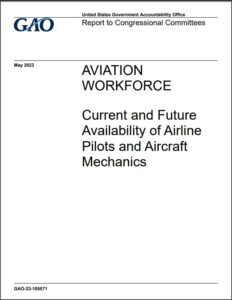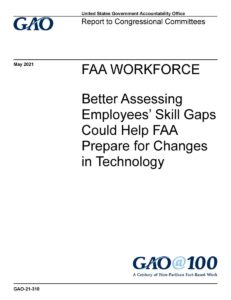GAO Workforce Report Makes Limited Use of Misleading Data
On May 17, the U.S. Government Accountability Office (GAO) released a report on the “Current and Future Availability of Airline Pilots and Aircraft Mechanics.” The GAO’s analysis reads like a travelogue of pandemic era discussions among and between aviation stakeholders about the struggle to find technical talent necessary to meet demand.
The report divides its narrative between pilots and mechanics – which it acknowledges are only “one of several types of aviation maintenance workers” – by reviewing FAA certification standards, employment data, and salary/wage trends. It then chronicles efforts to bolster hiring pipelines (like pathway programs) and resources available to support such development (like the ARSA-supported workforce grant programs established by the 2018 FAA reauthorization law).
For maintenance employers, the report highlights key factors described to the GAO as limiting career development efforts. In addition to pay and working conditions, which factor into all employment decisions, companies employing technicians face fierce competition from other industries and the cultural pressures produced by “stigma” associated with technical careers.
In 2020, the GAO reported that government data needed improvement to support efforts to promote a robust, diverse aviation workforce (see below). At the time, the review found that neither the government nor the business community could accurately assess the workforce, detect trends, or prepare for future needs. Despite covering more than 50 pages and recording numerous interviews, the authors of the new report admit their analysis relies on incomplete or misleading data.
“The total pool of mechanic certificates increased [from 2017 to 2022]; however, these data provide limited information about the supply of aircraft mechanics, as the number of certificate holders who have left the industry since 2017 is unknown,” the new report said. “Additionally, available data provide limited information on the extent of demand for aircraft mechanics.”
The problems associated with these limitations are exacerbated by the fact that mechanics form only a portion of the maintenance workforce. While the GAO does little to expand on this detail beyond its basic acknowledgement, the broad range of non-certificated personnel employable by repair stations means that FAA data on certificated persons provides only a glimpse of the larger community.
Despite this overarching limitation, the government’s auditors clearly recognize the larger problem. In the short podcast episode released with the report, GAO Director of Physical Infrastructure Issues Heather Krause explained: “Aviation is a critical component of the economy, so the viability of the workforce is a federal interest.”
To support that critical component of the economy, ARSA continues to press the government to accurately describe the various pathways through maintenance careers and improve policies for training and regulatory compliance while helping certificate holders understand the flexibilities of the personnel rules in part 145, subpart D.
For more information about the GAO report, including the companion podcast, click here.
Previous GAO reports on the aviation workforce...
5/17/21 - GAO Critiques FAA Workforce Planning
On May 13, the U.S. Government Accountability Office (GAO) released an assessment of FAA workforce planning.
The report was required by the FAA Reauthorization Act of 2018. The law tasked the GAO to review several matters, including FAA identification of critical skills needed to keep pace with new technologies. The analysis found the agency must improve how it adjusts standards for its personnel against advancing technology.
“FAA’s agency-wide workforce-planning efforts are critically important because the aviation industry today is undergoing significant changes that will affect its operating environment and workforce needs in the future,” the report said. “Mission-critical occupations that [agency] officials said are particularly important today and may be even more so in the future are aviation safety inspectors, air-traffic-controller specialists, airway transportation-system specialists, professional engineers, system inspectors, and engineering and electronic technicians.”
The GAO reviewed and critiqued the FAA’s ongoing workforce planning efforts by assessing management and employee involvement as well as the breadth of potential skills and technology areas considered. In doing so, the GAO discovered many of the needed skills identified by the FAA Office of Human Resources Management were consistent with those described by industry stakeholders (including ARSA), but the scope of the agency’s inquiry needed expansion.
“Recognizing that additional skill gap information is needed…[the FAA] will complete additional skill gap assessments, but not until [improving] coordination on workforce planning. According to officials, a critical first step is to build up its agency-wide capacity for conducting workforce planning and to establish a mechanism to coordinate with offices on agency-wide workforce-planning activities, including future skill-gap assessments and actions for acquiring critical skills,” the report concluded.
ARSA was engaged by the GAO in July 2020 to discuss FAA workforce needs. The association illustrated how inspector knowledge and capacity for critical thinking directly impacts certificate holders. While certain specific skill areas were discussed, ARSA’s team provided guidance on how FAA personnel can proactively engage industry to allow for continued learning and process improvement regardless of technology or skill-specific needs (which will always change).
ARSA members should stay tuned for the next edition of the hotline for its analysis of the GAO’s findings and some information for repair stations looking to help the FAA keep up with the times.
To download a copy of the report and for more information from the GAO, click here.
2/11/20 - GAO Workforce Report Can Be Resource for Industry
February 11, 2020
On Feb. 6, the Government Accountability Office (GAO) released the first in a series of reports mandated by the FAA Reauthorization Act of 2018 to study aviation industry and agency workforce, career development and training matters.
Additional Coordination and Data Could Advance FAA Efforts to Promote a Robust, Diverse Workforce
U.S. Government Accountability Office
February 2020
GAO recommended that FAA use its existing data and coordinate with other federal agencies to identify and gather information to measure progress and target resources toward its goal of promoting a robust, qualified, and diverse aviation maintenance workforce. FAA agreed with the recommendation.
The report was developed by direction of section 624 of the FAA reauthorization law, which had been championed by ARSA. In working with Congress to develop the relevant language, the association drew on its experience dealing with a confusing maze of government resources and the struggle to better organize data for tracking aviation maintenance personnel.
Picking up on its legislative instruction, the GAO produced a report that examines:
(1) What available federal data reveal about the FAA-certificated aviation maintenance workforce.
(2) How selected government agencies, educational institutions and businesses provide support and coordinate to develop the aviation maintenance workforce.
(3) The progress FAA has made in update its curriculum, certification and testing standards for mechanics.
The report team performed this work by analyzing available government data, chronicling programs and resources supporting aviation career development and interviewing/observing industry stakeholders. ARSA was among the 16 semi-structured interviews administered with employers, technical schools, unions, training organizations and other trade associations.
In general, the final report indicated that government-managed data for analyzing the aviation workforce is misleading. Information available through the FAA, Bureau of Labor Statistics and other organizations does not accurately portray the current state of maintenance employment, nor does it differentiate among and between the types of individuals, e.g., certificated vs. non-certificated, working in the industry. As a result, neither the government nor business community can accurately assess current employment, detect trends or prepare for future needs.
In addition to this analysis, the report reviews broad range of government programs and opportunities that can serve maintenance employment. It also makes – albeit subtly – key points that confirm long-standing arguments made by ARSA and its allies regarding the scope of the maintenance workforce stretching far beyond mechanic certification and the challenge of inter-industry competition for technical talent. It also provides direction to the government to improve its data analysis and strategically use its resources to support industry personnel needs.
“Both the federal government and other industries benefit from having a professional, trained and qualified workforce, and addressing aviation workforce needs is a shared responsibility among…different stakeholders,” the report’s conclusion said. “However, without strategically using or analyzing the data it has along with data other stakeholders collect, FAA will not have certain information it needs to target its resources or measure and improve progress toward its aviation workforce goals.”
In offering solutions, the GAO focused on the relatively-new FAA Workforce Steering Committee. The internal agency body presents “an opportunity to engage other federal agencies to explore potential data sources…and discuss ways to expand, diversify and strengthen career pathways for the aviation maintenance workforce.”
To review the full report, click here. ARSA will continue to work with the information provided by the GAO, engage FAA and work with other stakeholders to make good on the many workforce-related mandates that came out of the FAA reauthorization process.
Stay tuned for more on this report as well as additional releases from the GAO.
9/1/05 - Survey Reveals Gaps in Inspector Training
September 1, 2005
A new Government Accountability Office (GAO) report (GAO 05-728) examines FAA efforts to ensure that its inspectors receive adequate technical training needed to do their jobs. It includes a GAO analysis of the inspector training program, and the results of a survey of FAA inspectors. The GAO generally approved of the FAA’s achievements but stressed the need for better evaluation of the effects of training on inspector performance. The results of the survey, however, painted a very different picture.
The FAA inspectors surveyed generally felt they did not receive adequate technical training. The FAA’s own data shows that less than half of FAA inspectors have completed at least 75% of essential technical courses. Only slightly more than half of the inspectors surveyed said that they thought they had enough technical knowledge to do the job. Almost 60% said their training was delivered in a timely manner “to some or no extent.”
GAO consulted ARSA Executive Director Sarah MacLeod and VP-Operations Paul Hawthorne in preparing the report, which is entitled Aviation Safety: FAA Management Practices for Technical Training Mostly Effective; Further Actions Could Enhance Results.










